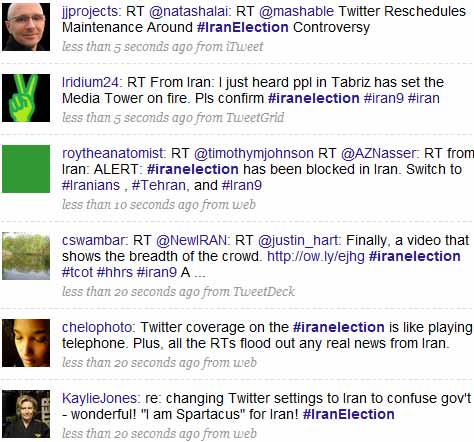One of my first thoughts on seeing Twitter being used by Iranians following their elections was, 'Imagine if they had Twitter during Tienanmen Square.' Totalitarian regimes historically thrive, in large measure, by controlling the media and modes of communication. Would be protesters become isolated. Government propaganda simply spins any protest or event into something that reflects well on the regime in power.
Yet now there is Twitter, other social networks, and the internet at large. It's wise for Tweeters and others to understand that the deck is still stacked against those protesting the election. The Iranian government still controls the media, and in a textbook totalitarian move they have banned foreign press. While members of the Twitter community have set up proxy servers for people in Iran to use, the government has shut down known internet connections, which means that in all likelihood a large majority of Iranians are only hearing the official government version of events.
Yet protests continue and news spreads in large part due to Twitter and the internet. This is not something past totalitarian regimes have had to deal with. There are enough Iranians using Twitter (or other forms of communication) to organize that protests continue. The government has not been able to implement complete control. Hopefully those watching, participating, and following #iranelection on Twitter recognize that there is a definite possibility that this ends very badly as totalitarian regimes are also brutal. The reality is that what results from this is wholly a guess, but it changes the playing field and gives voice to those who previously had none. Person to person communication tools change the dynamic shifting, at least some of the power to the people, and puts a crack in structure of totalitarianism.


Twitter Changing the Playing Field In Iran and For Totalitarianism

Yet now there is Twitter, other social networks, and the internet at large. It's wise for Tweeters and others to understand that the deck is still stacked against those protesting the election. The Iranian government still controls the media, and in a textbook totalitarian move they have banned foreign press. While members of the Twitter community have set up proxy servers for people in Iran to use, the government has shut down known internet connections, which means that in all likelihood a large majority of Iranians are only hearing the official government version of events.
Yet protests continue and news spreads in large part due to Twitter and the internet. This is not something past totalitarian regimes have had to deal with. There are enough Iranians using Twitter (or other forms of communication) to organize that protests continue. The government has not been able to implement complete control. Hopefully those watching, participating, and following #iranelection on Twitter recognize that there is a definite possibility that this ends very badly as totalitarian regimes are also brutal. The reality is that what results from this is wholly a guess, but it changes the playing field and gives voice to those who previously had none. Person to person communication tools change the dynamic shifting, at least some of the power to the people, and puts a crack in structure of totalitarianism.


Twitter Changing the Playing Field In Iran and For Totalitarianism





